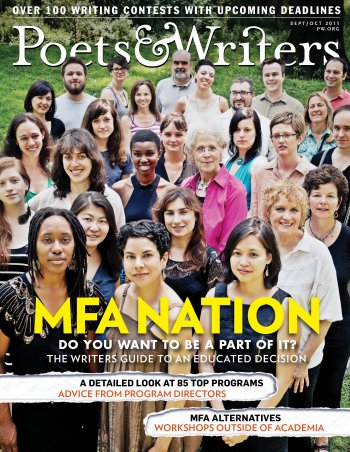
A special section on MFA programs, including our rankings of the top programs, plus alternatives to the degree; profiles of novelists Julie Otsuka and Sam Savage; the state of book reviewing; and more.
Jump to navigation Skip to content

A special section on MFA programs, including our rankings of the top programs, plus alternatives to the degree; profiles of novelists Julie Otsuka and Sam Savage; the state of book reviewing; and more.
A decade after the attacks, American poets and fiction writers still grapple with their unique role in understanding and responding to what happened, even as the real-life narrative of 9/11 continues to unfold.
Sam Savage wrote for decades and eventually gave up completely before his debut novel was published when he was sixty-five. Now he's an international best-selling author with a third novel, Glass, published by Coffee House Press, and one...
In her second novel, Julie Otsuka returns to the chapter in Japanese American history that captured the attention of so many fans of her debut: the relocation camps of World War II.

Sam Savage wrote for decades and eventually gave up completely before his debut novel was published when he was sixty-five. Now he’s an international best-selling author with a third novel, Glass, published by Coffee House Press, and one simple message for all of us: Art can save you.
Directors, coordinators, and professors of full- and low-residency MFA programs offer some advice for prospective students trying to decide which programs are right for them.
For writers looking to hone their craft outside of university walls, there are a wealth of workshops and learning opportunities offered by literary centers and collectives across the United States. We've rounded up eleven nonaccredited programs...
As taxpayer dollars for individual artists and the patronage of the wealthy become the stuff of literary legend, putting stock in MFA programs—as a student or tuition-paying parent—may be a modern means of investing in American literature.
Leaving the protected writing culture of an MFA program can be a shock to the creative system, but with a little perseverance, there are ways to sustain a writing life after you graduate.
Success in writing is by no means determined by a degree, as exemplified by authors such as Dave Eggers, Jonathan Lethem, Amanda Stern, and Elizabeth Strout—none of whom received an MFA.
Concluding that the degree-based program is a flawed model for learning to write, poet Fran Quinn has developed a series of popular weekend workshops, held in New York City, Indianapolis, and Chicago, that offer a space where writers learn to...

The nation’s top fifty MFA programs based on popularity, funding, selectivity, fellowship-placement statistics, job-placement statistics, and student-faculty ratios, plus a look at other important program features, such as size, duration, cost of living, and foreign-language requirements.
Answers to the most commonly asked questions about our rankings of full-residency, low-residency, and doctoral programs in creative writing.
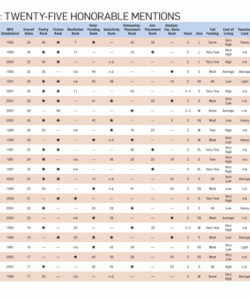
An additional twenty-five MFA programs in our annual rankings, from George Mason University in Fairfax, Virginia, to San Diego State University in California.
The top ten low-residency MFA programs in the United States, from Warren Wilson College in Swannanoa, North Carolina, to Goddard College in Plainfield, Vermont.

The top fifteen creative writing doctoral programs in the United States, from the University of Denver in Colorado to the University of Tennessee in Knoxville.
We’ve compiled this annual guide to graduate creative writing programs—which includes our rankings of the top full- and low-residency MFA programs (with honorable mentions) and, new to this year, doctoral programs—to provide a spark for the deep thinking and serious consideration that the process of choosing a program requires.
Attorney, poet, editor, and freelance journalist Seth Abramson explains the methodology used to compile the Poets & Writers Magazine 2012 rankings of postgraduate creative writing programs.

A writer peddles his bike two thousand miles, from the headwaters of the Mississippi River down to New Orleans, following a trail cut by Mark Twain on the riverboat he piloted more than a hundred fifty years ago.
This summer W. W. Norton announced plans to resurrect Liveright & Company, the storied imprint that introduced American readers to early works by luminaries such as Hart Crane, E. E. Cummings, William Faulkner, and Ernest Hemingway.
With so many good books being published every month, some literary titles worth exploring can get lost in the stacks. Page One offers the first lines of a dozen recently released books, including Terese Svoboda’s Bohemian Girl and Sven Birkerts's The Other Walk, as the starting point for a closer look at these new and noteworthy titles.
In this regular feature, we offer a few suggestions for podcasts, smartphone apps, Web tools, newsletters, museum shows, and gallery openings: a medley of literary curiosities that you might enjoy. This issue’s 3 for Free features the Poetry Foundation’s new app, Google’s online Art Project, and Project Gutenberg.
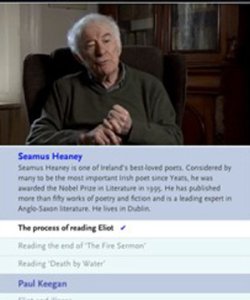
Recently released amplified editions of classics such as Jack Kerouac’s On the Road and T. S. Eliot’s The Waste Land indicate that the hybrid format may finally be coming into its own.
Small Press Points highlights the happenings of the small press players. This issue features Arktoi Books, the five-year-old imprint of California-based Red Hen Press that was established in order to open a conversation among lesbian writers.
Literary MagNet chronicles the start-ups and closures, successes and failures, anniversaries and accolades, changes of editorship and special issues—in short, the news and trends—of literary magazines in America. This issue’s MagNet features the Lucky Peach, Hippocampus Magazine, Shenandoah, Granta, Calyx, and Passager.
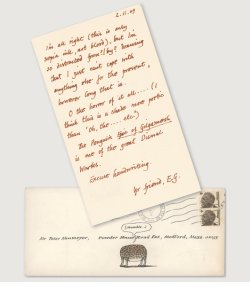
In this issue we offer a look at a note written in 1969 from Edward Gorey to Peter F. Neumeyer, included in the book Floating Worlds: The Letters of Edward Gorey and Peter F. Neumeyer, published by Pomegranate this month.
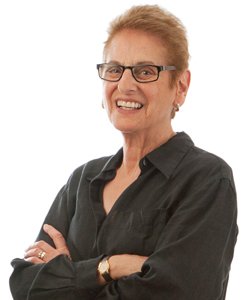
Newly settled into her position as editor of the Mary Burritt Christiansen Poetry Series at the University of New Mexico Press, Hilda Raz spoke about her hopes for the series.
For Mary Johnson, a former nun in Mother Teresa's order, the Missionaries of Charity, writing paved the path toward understanding her complex and sometimes embattled spiritual journey.
Despite the recent collapse of book review sections in newspapers and magazines, the form is still thriving across a variety of venues, from web-savvy publications to local papers.
The key to creating a compelling voice in fiction may be found in honoring the imperfections of your narrator—his limitations, delusions, and flaws.
Contributor Laurie Rachkus Uttich recalls an episode from childhood that marked her beginnings as a writer and explores the truth and lies and the space where words fall in between.
Novelist Ann Napolitano shares her experience with her first readers—those colleagues-cum-kindred spirits who can simultaneously break down and shore up her writing—and offers guidance for locating and cultivating your own.